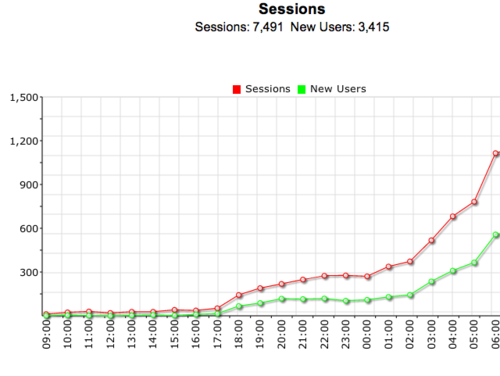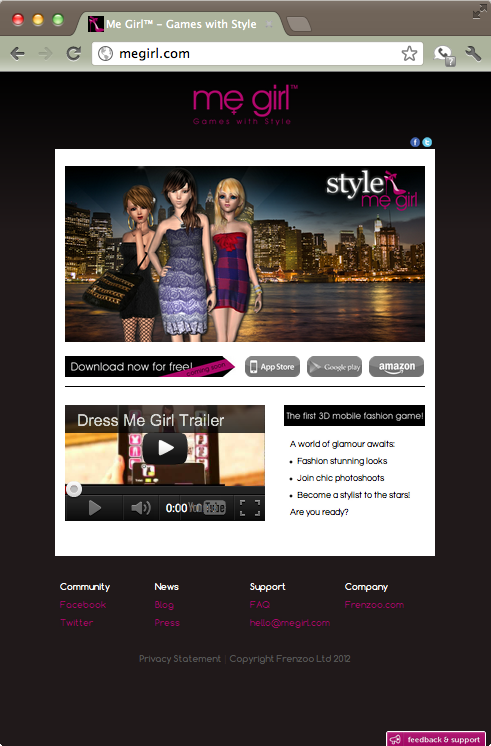Really THQ?
Was up in LA last week for my very first E3.
Glad I came. Bunch of awesome meetings mostly at JW Marriott, Millenium Biltmore and other hotels dotted around the convention center.
The time I spent actually at E3 itself, walking the show floor didn’t leave me with as positive an impression.
Take this “promotion” for THQ’s upcoming Darksiders 2*

Really THQ?
In this day and age must we objectify women to promote an apocalyptic action game?
Yes I get it, you’re targeting a male audience. And guys just like looking at sexy girls, no matter the product right?
This type of mindset is holding the industry back.
*I use Darksiders 2 as an example, plenty more on the show floor..
Choosing iOS game categories… just roll the dice?

So you’ve made a great iOS game, prepared your launch and are ready to submit.
Now how to pick your App store sub/categories?
Ranking within these subcategories after all is a critical part of picking up organic users, which is important for a successful game launch.
“Easy!” you say… “Just pick what your gut tells you perfectly fits your game, you dummy!"
Fair enough, but what if your game fits into multiple subcategories, then how to decide?
Like in our case with our first .
Hmm let’s see…
- We’re a 3d fashion game that young girls would like, so put it in Kids
- But then moms and entire families can enjoy it, so maybe put it in Family?
- But it’s a role playing game (you’re an aspiring stylist) so put it in RPG!
- But it’s mechanic is a fashion puzzler, so really it belongs in Puzzles
- Or maybe Strategy? Coz there is planning to what to buy and wear…
- Hang on, it’s really a Simulation of a fashion career come to think of it…
- But then again it has a mini game which is definitely very Arcade..
- …

Ugh….where the heck should it go?!
Having found no obvious choice, my inner engineer was itching for a number based approach to decide.
Searching around uncovered some great sources including by Casey Fleser, which I then stripped down to the possible categories and honing in on iPhone.
So let’s look at the % of top free iPhone games in the target subcategories:
Arcade 26.75%
Simulation 18.50%
Family 14.25%
Kids 13.50%
Puzzle 13.00%
Strategy 11.00%
Role Playing 8.50%
According to this the clear loser is RPG and clear winner is Arcade - that must be the one with the most demand and therefore the biggest demand, so just choose that one right?
But hang on, whilst there are a lot of players in that category, competition must be strong right, even for a unique game?
And does biggest demand mean biggest profits?
So let’s look at another way to slice it, by % breakdown of top grossing games:
Simulation 24.25%
Role Playing 20.75%
Arcade 20.00%
Strategy 17.25%
Family 10.50%
Puzzle 9.75%
Kids 5.00%
Hmm, the picture changes significantly. Arcade isn’t on top now. It isn’t even #2nd…
So let’s take another way to slice it, this time by ratio of top grossing to top free ranking. ie- which subcategories were over or underperforming relative to their competition / volume.
Role Playing 244.12%
Strategy 156.82%
Simulation 131.08%
Puzzle 75.00%
Arcade 74.77%
Family 73.68%
Kids 37.04%
That seemed better.
Now we had the top subcategories that had the best "bang for buck”… and what we ended up running with:

Results?
The game ended up hitting the Top 10 free RPG game in over 15 countries. We also hit Top #10 in our secondary subcategory, Strategy, in a bunch of countries. Given it was a first launch and we had and still have a lot to learn, we were happy at how it turned out.

Lessons learned
- In the absence of an “only sensible choice” a methodical approach to choosing your app categories is a good idea
- Consider market demand, monetization and competition when deciding
- A racing game won’t find all the racing fans who are searching in that part of the app store. At the end of the day, the choice should “make sense” *
- Secondary subcategory also plays (a surprisingly) important part, don’t just focus on the primary subcategory
Caveats and notes
- This is just one approach, there are plenty of others to go about deciding. Would love to hear any other others people are using out there..
- In the absence of a proper A/B test there is no way to isolate how much impact the subcategory choice. Certainly there were other factors for the launch that played their part too (more in a future post).
- Apart from pure numbers, there are plenty of other marketing considerations. For example for us we didn’t want to get labelled as just a “kids” game, given half our audience is adult
- Although I haven’t done it myself, I’m assuming this type of approach would work to other app categories apart from games
* Although it would be interesting to explore the impact of a “novelty” choice that sticks out of a “wrong” category. Perhaps an interesting future blog topic…
Shockingly easy way to get thousands of users to your new app
It’s THE challenge for mobile app developers.

How to get a new app noticed amongst literally a gazillion others?
I’d been mulling this over leading up to the launch of our first .
We were confident we’d created something unique and fun. But would any even get to see it?
So a plan was put together leading up to a big (for us) marketing campaign:
1. Private alpha on iOS to validate MVP (done)
2. Public beta on Android to tune for monetization & retention (done)
3. Launch on iOS as a paid app for final run with testers and friends (last weekend)
4. Change price from paid to free in preparation for marketing (yesterday)
5. Begin our marketing campaign (starting later today)
Whilst the real judge of the plan will come out of #5, something interesting came out today in this part*
4. Change price from paid to free…
We found though when we changed from paid to free, within an hour we started appear on several “Sale Alert” sites and apps:

Which then corresponded in our analytics to a big uptick in the new install rate:

Which in turn led to our game starting to appear for the first time on several charts:

We originally went out as paid to discourage people from downloading and give us a chance to iron out kinks before starting marketing.
And by doing that and subsequently dropping to zero, we got thousands of installs in a few hours.
All before spending a single dollar on marketing.

Caveats:
- I wouldn’t say I recommend it, if you’re large you’ll annoy a lot of users
- if you’re small, you’ll annoy first adopters who commit to you (as we’ve found out)
- you can’t start free, then go paid then go free and have the same impact
- yes, 3000 users is small, but for a small startup it can kick start your growth
- most important - this all doesn’t matter if your app doesn’t resonate with users (we spent months in beta first)
* ps - I’ll be blogging about the result of the marketing campaign and other parts in coming days, lots of fun things to share
Hostage negotiation (aka Buying a domain)
TL;DR - Domain squatters are smart. Be patient & plan well.
In the movies, hostage negotiation always seems glamorous.

Cool negotiator in shades. Panicky terrorist. An easy dance into submission.
I thought acquiring a domain name from a squatter would be similar.
I was wrong, totally.
While planning our new 3d mobile games, we had decided we needed a new brandname separate from .
After naming our first game beta Dress Me Girl (as generic as it gets, I know) we decided we actually quite liked the sound of Me Girl. Easy to spell, catchy in a “Me Tarzan and You Jane” way and surprisingly warm and personal. Bingo!
Of course, was already taken.
By a pro squatter with over 10k .
Ok, time to roll up the sleeves.
I studiously read Fred Wilson’s “” post, dusted off an old yahoo account and shot off the first mail, copied and pasted from another article I found at the top of Google search:
Hi,
I saw that this .com domain “megirl" is parked. I wondered what are your plans for it. If you don’t have plans are you interested in selling? If yes, what would be your starting price?
Thanks
The reply within two minutes gave me a shock:
$75,000.
, buyer pays fees.
This offer expires 3/27/12.
Thanks.
Wooah….$75k? For 6 measly characters? Let’s try something more reasonable…
Appreciate the reply.
Unfortunately that’s above my budget.
I could offer $12,000
A heartening reply…
Thanks for the offer. Can’t accept, sorry.
How about $45,000.
ok so we can’t agree on up front cost, but how about one last alternative:
Rent for 3 years for $16k total (paid up front) with the option for us to buy the domain for $30k at any time during the 3 years
ie- you’d get your $US 46k price
either way, you make an easy 16k while you’re waiting for someone who will buy it from you, either us or someone else
Surely this would appeal to his greed, a deal he couldn’t refuse?
I appreciate the offer. Can’t accept. Sorry.
But sure enough, a week later:
$30,000.
, buyer pays fees.
This offer expires 4/9/12
This time it would be my turn to go hardball, and it felt good!
$20k was my final offer. No budget to go higher.
Finally:
Okay, that’s a go
Awesome! A brilliant name for a fair, perhaps even good price.
was purchased and put to good use:

Looking back though I realized why he was sticking to $45k for some time. Why? Because it was just under the $50k Fred Wilson had recommended to spend on a great domain name. I nearly fell for it.
I had to admit how unprepared I was and how I should have approached it in hindsight.
Negotiating with domain terrorists: Lessons learned:
- Give yourself plenty of time for the negotiation (weeks or preferably months). If your deadline is short, you WILL get fleeced
- Have a few different alternatives so you don’t get emotionally attached to just one
- Read all the blogs about domain names, then know that domain squatters know that you’re also reading them - adapt appropriately
- Don’t reveal your real identity or use their name for your product before the domain is yours - if they know you have funding, expect the price to go up orders of magnitude
- Don’t disclose your real maximum budget as your budget to them, unless you’re weeks in and it’s not going anywhere (I ended up paying exactly what I stated earlier was my maximum budget - he knew that)
- Don’t be eager and play a little hardball…
Startup founders vs domain terrorists, unite.
